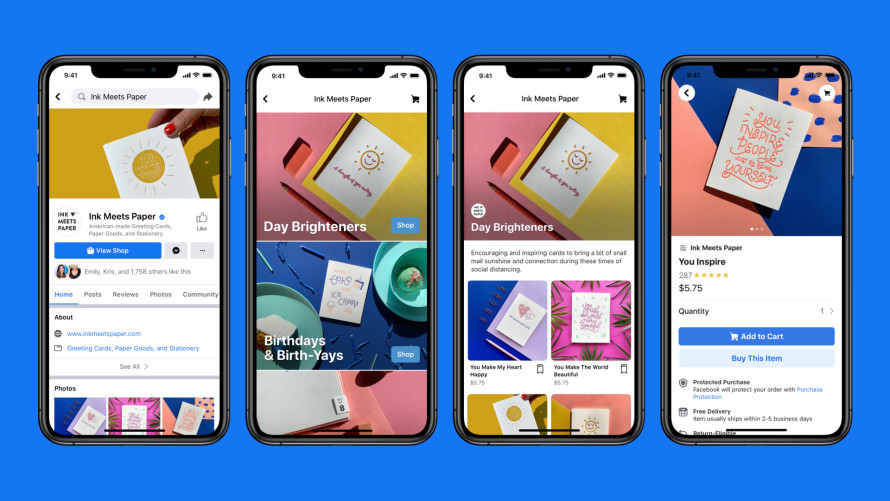What Facebook Shop can equip sellers
On May 19, Mark Zuckerberg officially announced the launch of Facebook Shop, aimed to assist small and medium enterprises (SMEs) in moving their business online for free.A standalone store
Not just a small section on Facebook Page, the new Facebook Shop is a separate tab next to Newsfeed, Watch and Marketplace. It will also be integrated with Facebook-owned visual social media Instagram. Facebook Shop can function as well as any store website or E-commerce platform. Sellers will be able to upload their products and services, set advertisements and sell directly on Facebook and Instagram. It also comes with E-commerce specialized functions such as detailed description, add products to cart or pay instantly via these platforms or the brand’s website. Businesses can customize their storefront with feature products, a cover image and accent colors that fit their brands as well. Vice versa, consumers can conveniently search for their favorite brands or products for purchasing, all in one place.
This summer, Instagram Shop will also be introduced starting in the US. It’s said to be a brand new way of discovering new products compared to Instagram Explore – a feature not wholly shopping-driven.
Facebook Shop can function as well as any store website or E-commerce platform. Sellers will be able to upload their products and services, set advertisements and sell directly on Facebook and Instagram. It also comes with E-commerce specialized functions such as detailed description, add products to cart or pay instantly via these platforms or the brand’s website. Businesses can customize their storefront with feature products, a cover image and accent colors that fit their brands as well. Vice versa, consumers can conveniently search for their favorite brands or products for purchasing, all in one place.
This summer, Instagram Shop will also be introduced starting in the US. It’s said to be a brand new way of discovering new products compared to Instagram Explore – a feature not wholly shopping-driven.
Easy communication & customer service
Communication with customers becomes much easier using Facebook Shop’s integration with Messenger, WhatsApp and Instagram, keeping all of your messages in one place. Unfortunately, for the moment this feature is only available in the US, awaiting global expansion. People are used to the traditional way of shopping on Facebook: They see something that they like on the brand’s Facebook Page, then they chat to inquire about it. With Facebook Shop, shoppers who reach the site can purchase the item immediately. Therefore, the main purpose of the brand fan page will be switched to an information channel instead of a purchase point.Enhancement features
Introducing the new Live Shopping feature, brands can tag products directly from Facebook Shop when live streaming for viewers to click in and see more details. Especially, augmented reality (AR) technology allows them to try on certain products such as clothes, accessories, lipsticks. After that, customers can chat, order and pay for the item solely via Facebook Shop. This feature is being tested and developed in the next couple of months. Furthermore, Facebook story is gonna enable product tagging as well. Facebook takes one step further by using AI and AR technology to showcase the product that are most appealing to the store visitor. For example, you will be able to customize what product should feature for a certain demographic.
Loyalty reward programs are now available between the brand and its customers’ Facebook accounts. Sellers can create and manage their programs as easily as customers when tracking their previous purchases and rewards.
Facebook takes one step further by using AI and AR technology to showcase the product that are most appealing to the store visitor. For example, you will be able to customize what product should feature for a certain demographic.
Loyalty reward programs are now available between the brand and its customers’ Facebook accounts. Sellers can create and manage their programs as easily as customers when tracking their previous purchases and rewards.
E-commerce partners
Facebook is working closely with partners like Shopify, BigCommerce, WooCommerce, ChannelAdvisor, CedCommerce, Cafe24, Tienda Nube and Feedonomics. As big names in the E-commerce industry, these organizations can offer SMEs the tools and services they need to kickstart their business from offline to online. For example, Shopify declared that merchants can control their storefront with Facebook Shop, while orders and inventory management can be executed directly from within Shopify.How Facebook Shop can outplay E-commerce platforms
Ironically, the Covid-19 pandemic gives E-commerce the push it needs to fully flourish. Being too dependent on their physical store, many SMEs had to shut down business as a result of the coronavirus crisis. One way to survive during this period is by moving online.Potential customers
The most important that Facebook can offer to merchants is the audience. As the end of March 2020, Facebook has 1.7 billion daily active users and 2.6 billion monthly active users. If we’re counting their family of apps consists of Messenger, WhatsApp and Instagram, the numbers are 2.4 billion and 3 billion respectively. An average user spends 38 minutes a day on Facebook, a number which is likely to increase during the coronavirus crisis. Many use it as a platform for recommendations for food, clothes, cosmetics, travel, etc. It is an unspoken rule for brands to have a social presence to find new customers, and Facebook is the most obvious choice.
Compared to E-commerce platforms, Facebook lacks in payment and logistics. However, the new Facebook Shop can solve that problem by letting merchants take care of it themselves. The key components for E-commerce success – the customer and the brands – are already in their pocket.
An average user spends 38 minutes a day on Facebook, a number which is likely to increase during the coronavirus crisis. Many use it as a platform for recommendations for food, clothes, cosmetics, travel, etc. It is an unspoken rule for brands to have a social presence to find new customers, and Facebook is the most obvious choice.
Compared to E-commerce platforms, Facebook lacks in payment and logistics. However, the new Facebook Shop can solve that problem by letting merchants take care of it themselves. The key components for E-commerce success – the customer and the brands – are already in their pocket.
One-app experience
One of the reasons that social commerce is still relevant despite the heavy promotions of various E-commerce platforms is convenience. While browsing through the news feed, people often get product recommendations that they can message to buy instantly without disrupting the whole experience. With Facebook Shop, the messaging step can be erased, creating an even more seamless experience. It’s also good news for advertisers as in-app purchasing will decrease bounce rates and optimize advertising fees significantly.AI and Big Data
It might be true that Facebook understands us even more than ourselves, following every interaction we have on social media. Through AI algorithms and Big Data, Facebook can display products of our interests with a high chance of us taking the bait.
Tagged E-commerce Insights, Facebook, Social eCommerce
